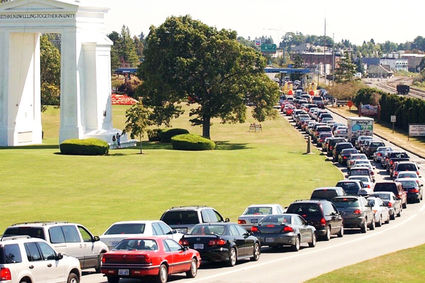South of Border: "Why Canadians have U.S. Post Office boxes, eh?"
August 7, 2019

United State Post Offices, like this one pictured in Whitlash, often have sizeable numbers of postal boxes rented by Canadians who live near the border. Using the USPS boxes Canadians can often avoid higher postage rates for items coming from the U.S. and most say their orders arrive more quickly. For the smaller post offices the additional income from Canadians often allows additional services to be offered.
Column No. 23
Since moving to Whitlash I'd notice vehicles, usually pickups, with Canadian plates stopped at the local post office. Recently I came across a newspaper story out of northern Washington state that described how U.S. border cities have many Canadians who rent post office boxes and support a sizeable number of private "parcel and courier services" that cater to Canadians getting mail and packages in the U.S.
I wanted to learn why U.S. Postal Service boxes were in such demand in border towns and began to ask around. Here's some of what I discovered about why Canadians rent U.S. Post Office boxes and use private parcel delivery services in the U.S.
How using U.S. Postal Service (USPS) mail boxes benefits Canadians
I always assumed only people living in the U.S. could rent USPS mail boxes. Turns anyone who presents two acceptable forms of ID (a valid driver's license and passport are most commonly offered), completes a postal box application form and pays the box rental fee can receive mail/parcels at a USPS postal box.
Canadian rancher George Henline lives in southern Alberta, about seven miles north of the border. It's another six miles to the Whitlash Post Office where he's maintained a postal box for "at least 20 years." Henline listed three advantages to being able to receive mail in the U.S .: 1) American manufacturers offer more consumer goods than are available in Canada; 2) for a variety of reasons most goods cost less when bought directly from a seller in the U.S .; and 3) it takes less time to get items directly mailed to a U.S. post office box than to an address in Canada.
Henline explained, "U.S. manufacturers and sellers offer a larger variety of goods than are not directly available in Canada. He added, "The ability to buy goods online has flattened the world. A few key strokes and I can have access to all the big box stores and retail warehouses in the U.S." He laughingly said, "When I go down to get packages at the Whitlash Post Office I say, "I'm going to Costco, Wal-mart and Target" down in Whitlash."
For Henline, purchasing directly from the U.S. is about saving money. He stated that many U.S. sellers will ship free to addresses in the continental U.S. Even if he has to pay postage, he said, "I'm paying domestic postage to my U.S. box rather than an international rate if it comes to my rural mail box."
Finally, as a rancher, saving time on getting a delivery is saving money. He gave an example of a baler part he recently had to order. "I went to the local dealer where I buy parts for my baler," he said, "and the dealer could get the part but it had to come from Indiana. That would be a minimum of a two week wait." Henline ordered the part direct and it was in Whitlash "in four days."
For items being shipped internationally to Canada Henline said they all must go through one of two Canadian ports-either on the east or west coast. He said, "If I order a part from Billings and it's shipped to me in Canada it goes through one of those two ports and that adds time (maybe two weeks) to receive the item. On top of that I'd be paying an international shipping charge which can be quite expensive." He avoids that cost and time delay with a post office box in the U.S.
Items received by Canadians at USPS postal boxes are still subject to the GST (Goods and Services Tax), a five percent tax assessed on most goods and services purchased in Canada. Items brought into Canada are subject to the tax at the time they cross the border. Henline added, "In reality the border officials are looking for big ticket items. If there is a line at the border and things are hectic they might not take the time to do the paperwork on a $10 item that would only yield 50 cents in the tax."
In towns near busy border crossings and close to large Canadian cities rental of USPS boxes by Canadians is more prevalent. At the Sweetgrass–Coutts Border Crossing, near the town of Sweet Grass, Montana where I-15 enters the international border, about 80% of the USPS boxes in town are rented to Canadians. At the Whitlash Post Office one third of boxes are rented to Canadians, in Turner 50% and further east, at Loring, two-thirds of the boxes are rented by Canadians. One result of those rentals is that smaller post offices can offer a higher level of service than they could without the income from the Canadians.
And, it's not uncommon for Canadian businesses or individuals to bring their parcels with U.S. addresses to a border USPS facility because domestic mailing in the U.S. is significantly cheaper than if they were paying an international rate from Canada. The Honey Bee implement company, a custom header manufacturer in southern Canada, brings invoices to Turner to be mailed to its U.S. clients.
Parcels outside the U.S. Postal System
Some items are too heavy, too large or fail to meet some other norm to use the USPS. They often ship through independent carriers like FedEx and UPS. A sizeable number of "parcel handling businesses" allow Canadians to receive packages in the U.S. from independent carries and be picked up by crossing the border. A study of 686,000 annual border crossings at Blaine, Washington found that in 2007 about two percent of the crossings were to pick up mail, by 2018 eight percent of Canadians were picking up mail.

In areas near busy international crossings one downside to Canadians having to cross the border to pick up packages and mail can be traffic jams. This photo shows traffic on a holiday weekend at Blaine, Washington, where I-5 crosses in to British Columbia. Canadians often have to figure the best times to cross the border if they have a USPS postal box or use an address at a private U.S. parcel service to receive shipped items.
The number of Canadians using USPS and parcel services in the U.S. seems to be growing with benefits to both Americans and Canadians. George Henline said, "One downside of crossing to get mail and parcels is not supporting our own economy. But the savings in money and time often dictate the most obvious course-get a USPS post office box or obtain a U.S. address for receiving packages through a private parcel service in the U.S."


